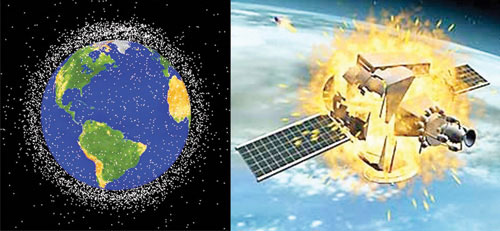Headache of satellite security
From cosmic garbage to the emergence of satellite-killing weapons, safety issues - space security is worrying many parties.
AFP announced on May 24 that the Ecuadorian Space Agency (EXA) said the country's Pegaso satellite touched a piece of a S-14 rocket launched by the Soviet Union in 1985. The incident occurred. at about 5:38 pm (GMT) on May 22 at 1,500km altitude above Madagascar's east coast. According to EXA's engineers, Pegaso, the first satellite manufactured by Ecuador was damaged and could not continue to transmit data but is still floating in orbit. The collision occurred only a few months after a Russian satellite hit Chinese satellite garbage. According to Space.com, on January 22, a fragment of Fengyun 1C satellite crashed into Russia's Blitz satellite, causing serious damage.

There are about 5,500 tons of garbage on earth orbit, including satellite debris
Fengyun 1C was shot down in 2007 (Photo: NASA / Globoscope.ru)
Notably, according to Voice of Russia, Fengyun 1C was destroyed at an altitude of 850km in 2007 during a test of satellite-launched missiles made by China. At that time, the experiment was carried out from the West Xuong Satellite Launch Center in Sichuan Province, making the US and some other countries strongly opposed. Recently, The Washington Free Beacon website quoted American officials as saying that China on May 13 again tested a new satellite-destroying missile, also from Xichang. The Chinese side announced the missile to 'put a research device from the Earth's atmospheric field into orbit'. However, Pentagon spokesman Monica Matoush said: 'According to our observation, there are no satellites or objects separated from the missiles to go into orbit'. Officials and American experts determined that this is the Dong Ning-2 rocket and that China is making efforts to have it reach its height of 19,000 - 35,000km above the surface of the earth. Then, in theory, Chinese missiles could threaten satellites of the US global positioning system.
Many risks
Space.com quoted experts as estimating that there are currently 5,500 tons of garbage with 370,000 fragments flooded with space around the earth, including unused missiles, dead satellites and debris generated from test cases. weapons. They can lead to the risk of chain collisions, threatening astronauts' lives on space ships or at the International Space Station as well as affecting the prospects of space tourism.
In order to avoid creating more cosmic garbage and preventing armed space racing, so far, the United States and Russia have all given up on satellite weapons tests, according to Space.com. However, the situation seems to be changing after China's moves. In January, Hoan Cau newspaper published a commentary that Beijing needs to continue to promote research to destroy satellite weapons. Soon after, The Indian Express said India also needed to strengthen its field if it did not want to be threatened in the future.
For its part, after China's latest launch, the US Department of Defense quickly announced it would have a weapons-making program to protect its telecommunications and intelligence satellites, according to Reuters. The Pentagon did not disclose details but only said that investing in technology to ensure the safety of satellites within the 2014 defense budget.
Russia is working on a 'clean-up' system capable of removing large-scale debris from critical areas in orbit near the earth as well as automatic warnings of serious situations, according to RIA- Novosti. Recently, Boeing Group has also proposed the idea of removing dead satellites and other debris around the Earth's orbit by using a stream of air to push them back into the atmosphere.
- Headache - symptoms of many causes
- Good foods for people or headaches
- Eat 'standard' to dispel headaches
- Headache when you need a CT scan, MRI?
- 9 common headaches and treatment
- Tips to cure a headache after only 10 seconds
- 7 ways to prevent headaches without taking medicine
- The woman predicted rain, storms thanks to ... headache
- Use satellites to detect opium
- Russia tests 'killer satellite'
- Why is drinking wine a headache?
- 'Love hormone' helps cure headaches
 Van Allen's belt and evidence that the Apollo 11 mission to the Moon was myth
Van Allen's belt and evidence that the Apollo 11 mission to the Moon was myth The levels of civilization in the universe (Kardashev scale)
The levels of civilization in the universe (Kardashev scale) Today Mars, the sun and the Earth are aligned
Today Mars, the sun and the Earth are aligned The Amazon owner announced a secret plan to build a space base for thousands of people
The Amazon owner announced a secret plan to build a space base for thousands of people Artificial satellite missing for 40 years suddenly returns, leaving scientists bewildered
Artificial satellite missing for 40 years suddenly returns, leaving scientists bewildered  What exactly is the space signal detected by Tesla?
What exactly is the space signal detected by Tesla?  Satellite debris poses a serious threat to the atmosphere
Satellite debris poses a serious threat to the atmosphere  Declassified spy satellite, 1,400-year-old ghost town appears
Declassified spy satellite, 1,400-year-old ghost town appears  Britain's oldest satellite mysteriously moves
Britain's oldest satellite mysteriously moves  Boeing satellite explodes in space
Boeing satellite explodes in space 